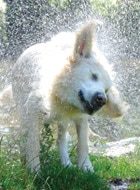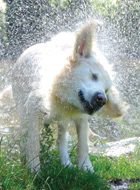

Why Do Dogs Shake?
An
athlete is hit hard in a game and is momentarily stunned with pain. The
coach
says "shake it off;" which he does, literally, either by wriggling the
affected
body part or by shaking his head to clear the cobwebs. Likewise, when
the play
between two dogs gets a little too rough, first one dog, and then
invariably
the other, stop what they’re doing and then shake themselves off just
as if they
were drying off after a swim. At first this behavior seems
straightforward
enough, when we sustain a minor injury the rapid movement of muscles
gets warm
blood flowing into the area while simultaneously distracting us from
the pain,
and of course, post-swim, a dog wants to be rid of the heavy sheet of
water enveloping
their body. But that’s not the whole story either because dogs do this
even when physical contact hasn’t yet been made or after a tentative
first sniff of their partner.
Consider conducting the following
experiment (but only presuming you know your dog is okay with it). Approach
your dog and give him a nice big wrap around bear hug, pressing your cheek close
to his head, then disengage and standing quietly, observe his response.
Especially when a dog is indoors and can’t deflect himself by doing something
else, many dogs will shake themselves off just as if they’ve received a bop on
the nose or have pulled themselves out of the water. Why?
Because as a human being I know that
there aren’t enough hugs going round the world: were someone I love to give me
an unsolicited act of random kindness in the form of a big warm hug, I would
willingly return such an embrace. But then I guess that’s just me being mental given that
the human intellect can process context. However since dogs don’t process love on
the mental stage, as human beings are capable of doing, they tend to respond
quite differently and so you will probably see your dog step away and then shake off the hug.
The clue to the significance of the shake-it-off reflex can
be found in another oft-heard coaches’ bromide, "walk-it-off."Emotion
is
energy-in-motion, which is why the more emotional we feel the more
animated we
become and want to move. And as energy emotion has an internal dynamic
of
movement that works quite like the tides in that there is a rising and
an
ebbing effect. When emotion sweeps over us, we can feel it surge as if
we’re a tidal basin being flooded with a wave, and then these
effects slowly subside and in fact can linger for a very long time. So
in the animal
mind, when there is an input of love that falls outside this natural
rhythm,
the canine mind doesn’t necessarily process it as love, but rather as
social pressure, which
to a dog is equivalent to pain and since the emotional circuitry
piggybacks on the most basic systems of physiology, the dog shakes it
off.
From the Psychology Today Blog of Michael J. Formica:
"A recently published study suggests that intense feelings
of social rejection are experienced in much the same way as physical pain. The
study showed that the regions of our brain activated by
physical pain are similarly activated when we are confronted with an intense
experience of social rejection."
"The findings show that powerfully inducing feelings of
social rejection activate regions of the brain also involved in the sensation
of physical pain, while those same brain regions are rarely activated in
neuroimaging studies of emotion. Kross remarks that this is consistent with the
idea that the experience of social rejection — or, more generally speaking, social
loss — appears to represent a distinct emotional experience uniquely related
to physical pain."
And the best way to deal with rejection? Do what dogs do,
shake it off and keep on moving. So
my advice to dog
owners wondering how to show affection to their dogs if hugging and
kissing can
be construed by a dog as social pressure—is to do onto their dog
what they would pay for a masseuse to do onto them. A good massage is
performed
quietly and with a deep, kneading action that is calming rather than
stimulating. If the masseuse patted our heads, scratched our sides,
hugged us head to head and chatted
up a storm, I daresay there’s goes the tip. So to give a dog love,
nothing
beats a good rub-a-dub given slowly and deeply and I don’t know of any
dog that will shake off that kind of act of random kindness.
Join the newsletter and never miss out on dog content again!
"*" indicates required fields
By clicking the arrow, you agree to our web Terms of Use and Privacy & Cookie Policy. Easy unsubscribe links are provided in every email.